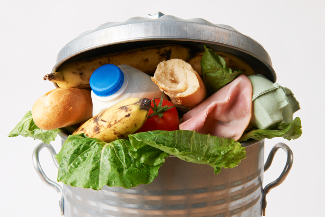Member State Page : Poland
Last updated on the 29/09/2023

Per capita: 106 kg in 2020
In total: 4 million tonnes in 2020
In total: 4.3 million tonnes in 2021

Primary production: 670 547 tonnes in 2020 Processing and manufacturing: 544 942 tonnes in 2020
Retail and other distribution of food: 320 396 tonnes in 2020
Restaurants and food services: 190 293 tonnes in 2020
Households: 2.2 million tonnes in 2020

Halve food waste by 2030
Target
The national strategy for preventing food losses and food waste (to be adopted) will enshrine the target of halving food waste by 2030.
Measure
The research project ‘Development of a food waste monitoring system and effective programme for loss rationalisation and food waste prevention’ (project PROM) developed a methodology to estimate the amount of food wasted across the Polish food supply chain and investigated the causes for food waste. Based on the results of the project, a national strategy for preventing food losses and waste was developed (currently subject to public consultations). The strategy will indicate directions for intervention and recommend priorities for action aimed at reducing food waste in the country, including legislative and self-regulatory solutions.
Statistics Poland collects and transfers data on waste, including on food waste, derived from the database operated by the Ministry of Climate – Central Waste System.
Act
Poland has undertaken legislative measures to prevent food waste and facilitate the provision of food for social objectives, which are simultaneously supported by national programmes and strategies.
The national waste management plan 2022 foresees the following measures with an impact on food waste:
- educational activities on food waste prevention;
- cooperation between the food manufacturing and the food processing sectors;
- green design;
- implementation of environmental management systems, such as EMAS, at company level;
- public awareness activities to prevent and reduce food waste (tips for shopping, planning meals, food waste management etc.).
The Act of 19 July 2019 on food waste prevention lays down the rules for handling food and the obligation for food business operators to prevent food waste. In line with the act, food business operators with a sales area above 250 m2 are required to establish an agreement with a non-governmental organisation in order to redistribute food not intended for sale, in particular, due to its appearance or its packaging. Furthermore, the act requires food business operators and their partner organisations to run educational/information campaigns on food management and food waste prevention at least once a year, for minimum two consecutive weeks. The act also provides the food waste fees (PLN 0.1 per 1 kilo of wasted food) and fines for failure to adhere to its obligations.
Under the operational programme Food Aid 2014-2020 (POPŻ), implemented as part of the Fund for European Aid to the Most Deprived (FEAD), specific rules were introduced to avoid food waste by the beneficiaries of the programme and its partner organisations, at several stages of its implementation. Such rules refer to storage, packaging and public procurement aspects. Partner organisations are required to monitor regularly the storage conditions in their warehouses and to redistribute foods according to their shelf life within set timeframes. Public awareness and education activities on avoiding food waste have also been carried out under FEAD, in order to promote reasonable food management and use of products by the beneficiaries of the programme. Partner organisations may also collaborate with food business operators in order to gather and redistribute surplus food for persons in need, beyond the operational programme Food Aid.
Since 2013, all donors who provide food for public-benefit organisations have been entitled to deduct VAT in Poland (Act of 11 March on goods and services tax – Journal of Laws [Dz.U] of 2016, Item 710, as amended). This applies to food business operators such as food manufacturers, distributors, wholesalers, restaurant-owners or caterers (art. 43 ust. 1 pkt 16 of the Act).
The Education Law (Journal of Laws [Dz.U.] of 2020, Item 910, consolidated text) includes measures to promote sustainable development aspects among children and young people. Schools carry out educational activities to make pupils aware about healthy diets, methods of food preservation, food economy in the country and around the world, taking into account environmental issues, raising awareness and developing habits to prevent food waste. The National Support Centre for Agriculture together with healthcare, agriculture and education experts have prepared educational materials and teaching resources for primary schools, including on the topic of food waste prevention.
Relevant resources
Links
